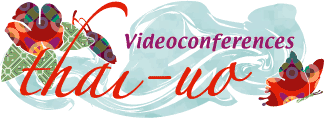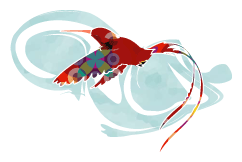Part 1: Project-Based Learning, Session 3
 |
||
 |
Documents |
|
Handouts and Resources Lecture Guide for Session 3 Slides for Session 3 |
Videos |
|
Online access to the videoconference lecture requires a broadband (DSL, cable, ethernet, etc.) Internet connection. The lecture is freely available below in Windows Media Player, RealPlayer and QuickTime formats for both Windows and Macintosh computers. Please note that, due to technical difficulties, this is a partially re-taped version of the lecture (not a copy of the live version). Session 3, Windows Media Session 3, RealPlayer Session 3, QuickTime |
Session 3 – December 16, 2005
Project Goals and Assessment
Leslie Opp-Beckman, University of Oregon
Linguistics Department, American English Institute
Email: leslieob@uoregon.edu or use the Contact web page.
Cindy Kieffer, University of Oregon
Linguistics Department, American English Institute
Email: ckieffer@uoregon.edu or use Contact web page.
About the Speakers
Leslie Opp-Beckman is a Senior Instructor in the MA Language Teaching Specialization program for the Linguistics Department at the University of Oregon. She also develops online training, teaches courses, and acts as Technology Coordinator for the American English Institute.
Cynthia Kieffer is the Director of Academic Programs and Research at the American English Institute, University of Oregon. She has many years of experience teaching in classrooms with students of all ages, as well as ongoing administrative experience as a supervisor and trainer for English as a Second Language (ESL) and English as a Foreign Language (EFL) educators.
Overview
This is the third session in 2005-06 in the 10-part professional development series for English as a Foreign Language (EFL) educators in Thailand. University of Oregon is partnering with the US Embassy in Bangkok, the Royal Thai Distance Learning Foundation, the Ministry of Education, colleagues at Chulalongkorn University, and at ThaiTESOL on this innovative and exciting project.
Discussion Questions
- What kinds of assessment should the project have?
- What is the relationship between the project’s goals and assessment?
- When should students receive information about goals and assessment?
- How much assessment is “enough” for the project?
Online Resources
Following are some recommended pedagogical and practical resources for this topic.
- Previously recommended:
Implementing Project-Based Instruction, from NW Regional Education Lab (NWREL).
Abstract: There is no one correct way to implement a project, but this site offers some things to consider when designing effective projects. You can acquire this set of articles at no cost from NWREL (text-only and PDF formats), or as a PDF from this UO-Thai site. - New: Authentic Assessment Toolbox. A project is more than a worksheet or single class activity. A project means getting your students to engage in real use of the language for a real reason. In this case, your students will create a report, display, or dramatization. Begin with the section on Characteristics and Types of Authentic Tasks and pay careful attention to the sections on “Products” and “Performance” at the end.
- New: Field-tested Learning Assessment Guide (FLAG). For instructors who are interested in new approaches to evaluating student learning, attitudes and performance. Offers broadly applicable, self-contained modular classroom assessment techniques (CATs) and discipline-specific tools. Recommend starting with the Assessment Primer (5 web pages total).
Post-Lecture Classroom Applications
You chose one of the following three project types to try in your class(es) plus a topic or theme .
- Reports: e.g. in notebook or folder format.
- Displays: e.g. in bulletin board, poster, or photographic format.
- Dramatization (performance): e.g. in the form of a skit, play, or interpretive music.
You have now created goals and a checklist for the project.
The following is a suggested follow up activity (or “homework”) in preparation for the next session.
Step 1
Based on the information from this session (see Lecture Guide), make any changes that you feel are necessary to your project goals and checklist.
Step 2
Choose the form(s) of assessment that best fit your goals, and create assessments that you will use with your project. Bring this information to the next session.